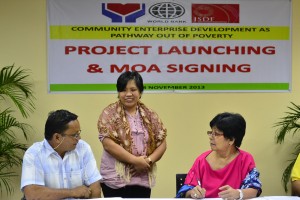
The Department of Social Welfare and Development (DSWD) launched last week the Community Enterprise Development as a Pathway out of Poverty, a project from a grant provided by the Japanese government through the Japan Social Development Fund(JSDF) managed by the World Bank.
“Japan continues its efforts for the improvement of the Philippines,” shared Hiroyuki Enoki, Second Secretary of the Japanese Embassy in Manila.
The 2.9 million US dollar grant will be used for a Community-Driven Enterprise Development (CDED) pilot led by the DSWD through its Sustainable Livelihood Program (SLP).
Patterned after the community-driven enterprise development framework, it seeks to improve the lives of the poor through market driven and resource-based community enterprises.
Improving quality of life
The JSDF-CDED project will be pilot-tested in Paracelis, Mountain Province; Libon, Albay; San Remegio, Antique; Siayan and Sindangan; Zamboanga del Norte; and La Paz, Agusan del Sur.
The municipalities were selected based on set criteria including poverty incidence higher than the national average and Local Government Units willing to adopt local economic plan in support of community enterprises.
The goal of the project is to improve the quality of lives of poor households in the pilot municipalities by increasing access to financial services, developing community driven enterprises linked to markets, and providing local economic development support.
Empowering the community
The JSDF-CDED project empowers the poor to participate in local economic activities and involves community members in addressing issues within the community.
Upon signing the Memorandum of Agreement with DSWD, Libon Mayor John Dycoco shared that the communities “must love and own this project like their little child to reap success.”
Ensuring sustainability
By the end of the project in 2016, at least 30% of the poor households in target communities should have access to financial services such as microcredit, savings, micro insurance or remittance services, and at least 20% of beneficiary households should have income above poverty line.
Moreover, to ensure sustainability, each of the communities should be able to develop at least one local product that has been linked to a more stable market. They should also adopt an annual local economic development plan that indicates the local government support for the identified value-chain product.
Collaborating efforts
The JSDF-CDED project is a fruit of collaborative efforts from both the public and private sectors. Representatives from partner line agencies and civil society organizations came as part of the National Livelihoods Technical Working Group .
DSWD Regional Project Coordinators of the pilot municipalities and SLP Director and JSDF-CDED National Project Manager Georgina Hernandez were present during the launch. Undersecretary Parisya H. Taradji and Poverty Reduction Programs Bureau Director Honorita Bayudan also graced the event.
The mayors of each of the municipalities were also in attendance, showing their support for the project.
Undersecretary Taradji, in her speech, stressed the “need for convergence… for the benefit of the whole country,” which the mayors resonated with.
Siayan Mayor Flora Villarosa added that the challenge is to cooperate and give their all to show that they value the initiatives of the government producing community-based enterprises that lead to self-sufficient communities. ###


